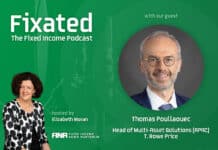
As global interest rates start to ease, investors are faced with new challenges and critical decisions in managing risk while seeking yield in fixed income portfolios. Andrew Canobi, portfolio manager and director at Franklin Templeton Fixed Income, provided insights on how to navigate this shifting environment, encouraging caution with term deposits and positioning fixed income strategies as the preferred direction at this point in the cycle.
Canobi highlighted the need for a conservative approach, particularly within the defensive section of fixed income portfolios. “You don’t want to take too much risk,” he noted, advising investors to “preserve capacity in your broader portfolio to take risk where it’s being well rewarded.”
He suggested that targeting yields “in the order of 100 to 200 basis points over the cash rate” remains a suitable goal within a conservative investment strategy. While there are higher-yield opportunities in private assets or equities, Canobi cautioned that these assets are “much riskier” and require careful consideration.
As some central banks start easing rates, Canobi discussed the potential disadvantages of sticking with term deposits in the current environment. Over the past 18 months, term deposits performed well due to the high cash rate, but this is beginning to change. “What we’re seeing, given the cycle, is that banks are starting to cut term deposit rates,” Canobi noted, as the market prices in anticipated rate cuts.
He pointed out the reinvestment risk for those tying up their money in term deposits now, explaining that as rates fall, reinvestment opportunities may become less attractive. “If you’re tying up your money now, there’s a lot more reinvestment risk coming in the next six to 12 months,” Canobi observed.
Also read: Life After The First Cut
He added that fixed income strategies may offer more favourable rates in terms of yield today and may allow investors to benefit as rates decline. “As those rates fall, you’re missing out on the upside that bonds will give you, which you wouldn’t get from term deposits due to their static nature,” he explained.
While much of the anticipated rate easing has already been priced into bond markets – “there’s already 250 basis points priced for the Fed to ease,” and in Australia, “about 125 basis points” – fixed income strategies still offer potential advantages.
Canobi cautioned against going “all-in on duration given how much has already been priced-in to the market,” but reaffirmed the benefits of bonds over term deposits in a falling rate environment.
































